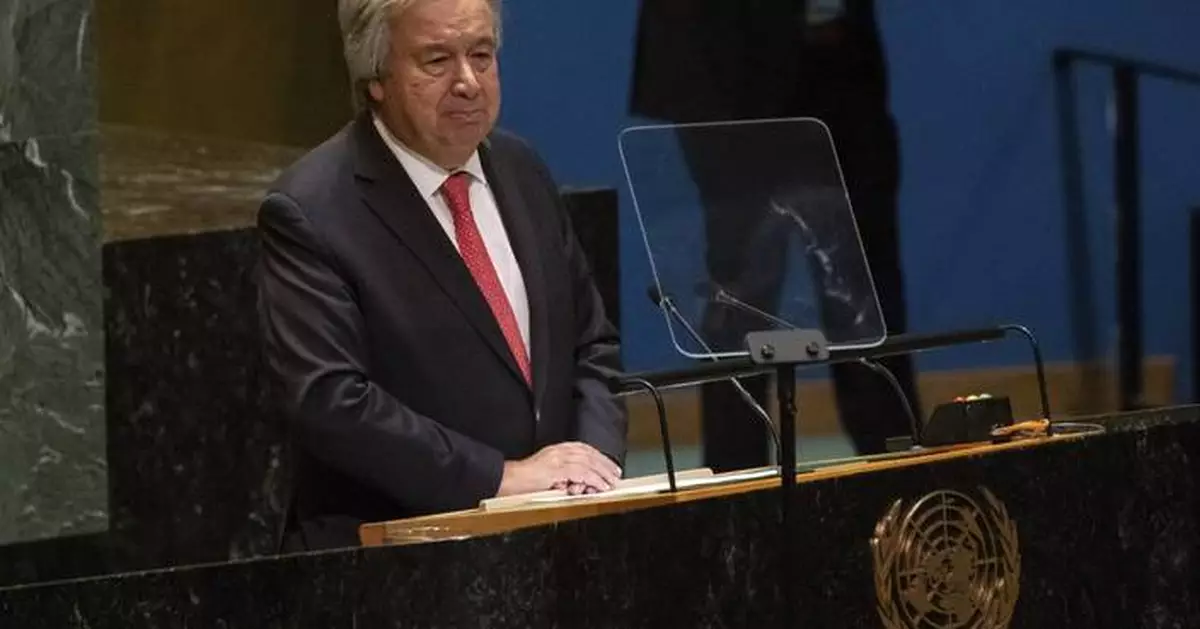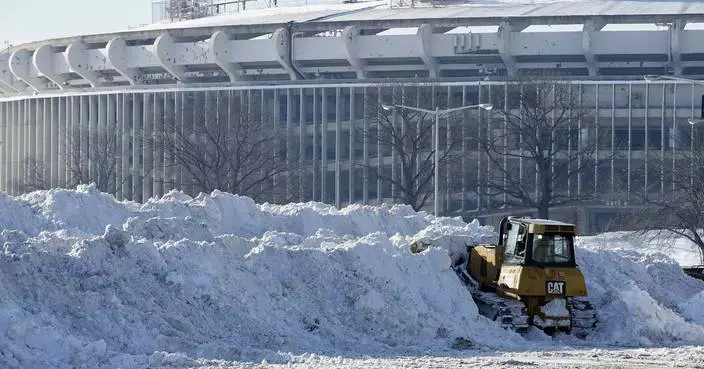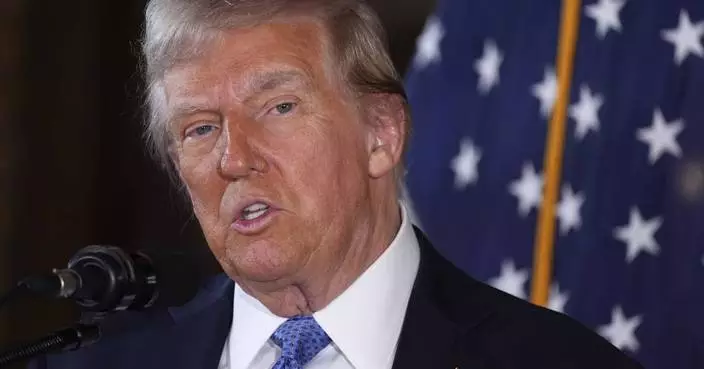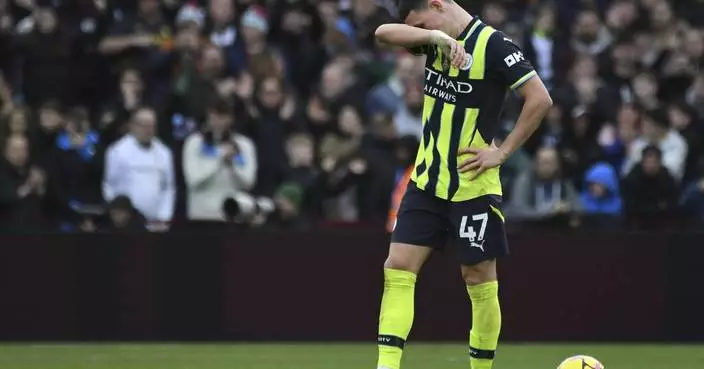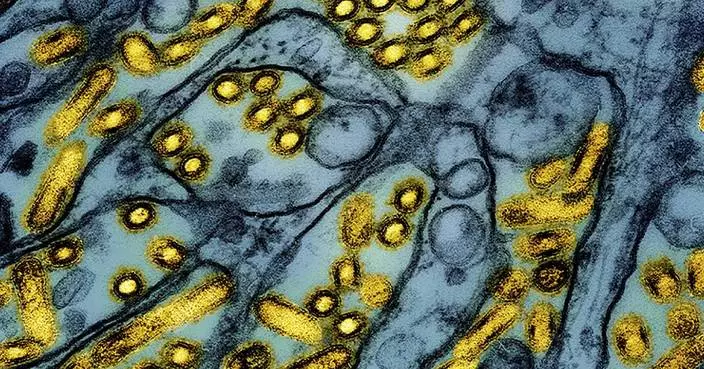UNITED NATIONS (AP) — The United Nations chief urged the world’s divided nations on Wednesday to compromise and approve a blueprint to address global challenges from conflicts and climate change to artificial intelligence and reforming the U.N. and global financial institutions.
Secretary-General Antonio Guterres told reporters that discussions on the “Pact of the Future” are in their final stretch and failure to reach the required consensus among all 193 U.N. member nations “would be tragic.”
A year ago, Guterres sounded an alarm about the survival of humanity and the planet and summoned world leaders to a Summit of the Future at their global gathering this year to unite and take action to reform the U.N. and other institutions established after World War II and address new global threats. It is taking place Sunday and Monday, just before Tuesday's start of the annual high-level meeting at the U.N. General Assembly.
Negotiations on the 30-page pact, now in its fourth revision, have been taking place for months, and in recent interviews and at Wednesday’s press conference the secretary-general has faced questions about its lack of vision, and what is different from U.N. documents adopted in recent years that haven’t been implemented.
“It’s very simple,” the U.N. chief replied.
All the previous “extraordinary, important declarations” were about what is needed to meet the challenges of the 21st century, he said. The Summit of the Future is about implementing those challenges, which requires reform of global institutions established after World War II including the United Nations.
Guterres stressed that in every area — from climate to AI — “there is a serious problem of governance,” and that’s what the Summit of the Future is about.
The draft Pact of the Future says world leaders are gathering “at a time of profound global transformation,” and it warns of “rising catastrophic and existential risks” that could tip people everywhere “into a future of persistent crisis and breakdown.”
But the draft says leaders are coming to the U.N. “to protect the needs and interests of present and future generations through actions in the Pact for the Future.”
It includes 51 actions on issues including eradicating poverty, combating climate change, achieving gender equality, promoting peace and protecting civilians, and reinvigorating the multilateral system to “seize the opportunities of today and tomorrow.”
Guterres pointed to “potential breakthroughs” in the pact including “the strongest language on Security Council reform in a generation,” and the most concrete steps to enlarging the powerful 15-member body since 1963.
He also cited the first measures to govern new technologies including Artificial Intelligence, a “major advance” in reforming international financial institutions, and a commitment to multiply resources for developing countries to meet U.N. development goals by 2030.
Urging member states to get the Pact of the Future “over the finish line,” Guterres said, “We can’t create a future fit for our grandchildren with systems built for our grandparents.”
U.S. Ambassador Linda Thomas-Greenfield told reporters Tuesday that a priority for the Biden administration at this year’s Summit of the Future is “to create a more inclusive and effective international system.”
She said the Group of 77 which now represents 134 developing countries at the U.N., the 27-member European Union and the United States all agreed to the fourth revision of the Pact of the Future.
But the U.S. ambassador said Russia objected to about 15 different issues, Saudi Arabia had problems with the climate language, and other countries objected to the language on reforming the international financial institutions including the World Bank and International Monetary Fund..
“I do think the Summit of the Future will make a difference,” Thomas-Greenfield said. “There are still some major differences. … But I am still hopeful that we will get there.”
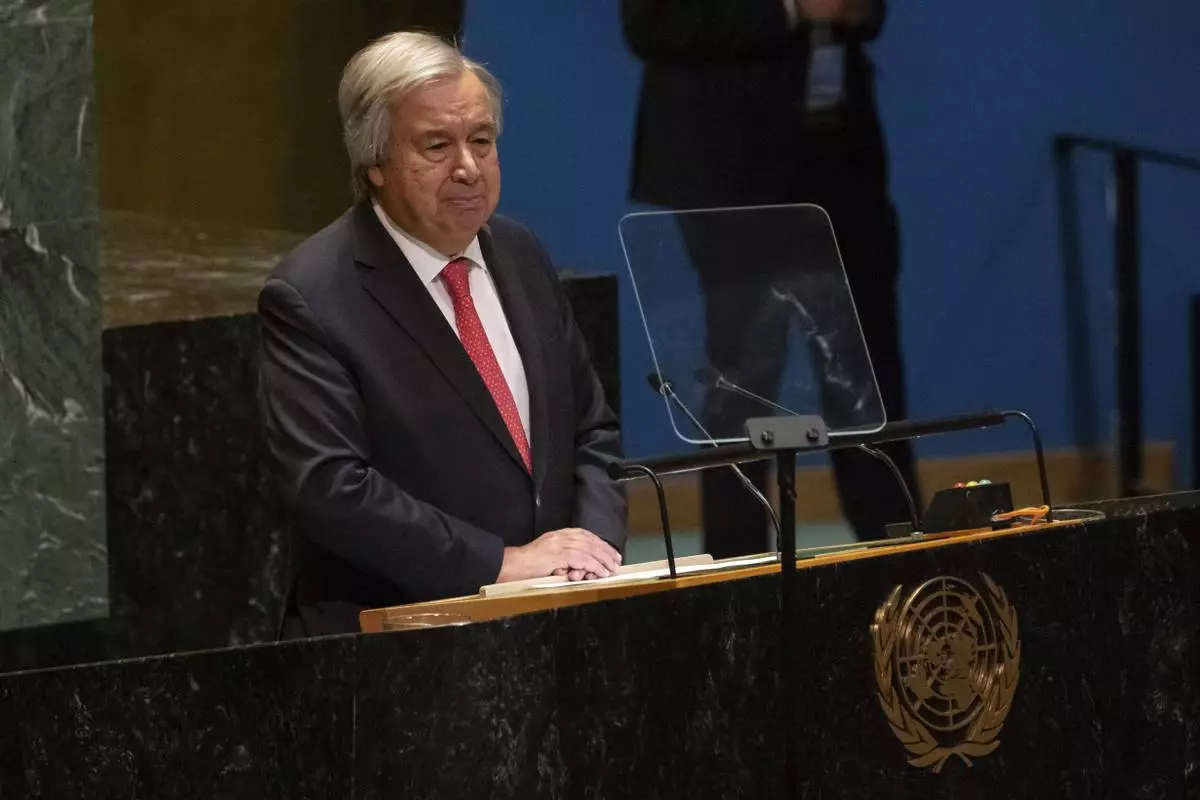
António Guterres, United Nations Secretary-General, speaks during the 79th session of the United Nations General Assembly, Tuesday, Sept. 10, 2024. (AP Photo/Yuki Iwamura)
New York Giants (2-12) at Atlanta (7-7)
Sunday, 1 p.m. EST, Fox
BetMGM NFL Odds: Falcons by 8 1/2.
Against the spread: Giants 4-10; Falcons 6-8.
Series record: Falcons lead 14-12.
Last meeting: Falcons beat the Giants 17-14 on Sept. 26, 2021, in East Rutherford, N.J.
Last week: Giants lost to the Ravens 35-14; Falcons beat the Raiders 15-9.
Giants offense: overall (29), rush (18), pass (30), scoring (32)
Giants defense: overall (T21), rush (31), pass (7), scoring (20)
Falcons: overall (9), rush (12), pass (6), scoring (20)
Falcons defense: overall (20), rush (13), pass (24), scoring (20)
Turnover differential: Giants minus-8; Falcons minus-7.
WR Malik Nabers had his third double-digit catch game of the season against the Ravens and joined Odell Beckham Jr., Jaylen Waddle and Brock Bowers as the only rookies in NFL history with three games of 10-or-more receptions. The No. 6 overall pick in the draft, Nabers has 90 catches for 901 yards and is two shy of breaking the Giants rookie record of 91 held by Beckham (2014) and Saquon Barkley (2018).
QB Michael Penix Jr. will make his first career start after the Falcons benched 13-year veteran Kirk Cousins. Penix, the Heisman Trophy runner-up at Washington in 2023, was the No. 8 pick in this year's draft but wasn't expected to land the starting job so soon. The timetable ramped up dramatically when Cousins threw nine interceptions and just one touchdown over the past five games. After pulling out an ugly 15-9 win at Las Vegas, where it became clear that the Falcons had lost confidence in their passing game, the decision was made to switch to Penix.
Atlanta's defensive front vs. Giants offensive line. After managing a league-low 10 sacks through their first 11 games, the Falcons have turned up the pressure with 13 sacks in three games since their bye week. Eight players have notched sacks during that span, led by OLB Kaden Elliss and DE Arnold Ebiketie with three apiece. With Drew Lock set to return as New York's quarterback after missing last week with a heel injury, the Falcons will be looking to bring the heat against a team that has allowed 45 sacks, tied for seventh most in the NFL.
Giants: QB Tommy DeVito, who started last week in place of Lock, is out of concussion protocol and should be the backup. … G Aaron Stinnie (concussion), LB Patrick Johnson (knee) and LB Bobby Okereke (back) are out. ... CB Greg Stroman (shoulder/shin) is doubtful. .. New York is hopeful CB Deonte Banks (ribs) can return after sitting out the last three games.
Falcons: K Younghoe Koo was placed on injured reserve with an undisclosed issue, knocking him out for the rest of the regular season and putting his future with the team in doubt. Koo had been one of the league's most reliable kickers, but he has missed a career-high nine field-goal attempts this season. ... The Falcons brought in Riley Patterson to take Koo's spot. WR Casey Washington (concussion) is out.
The Falcons have won three straight in the series. ... New York's most recent win over the Falcons was a 30-20 triumph in 2014. ... The Giants' most recent win in Atlanta was a 31-10 blowout in 2007. ... The teams have met once in the playoffs, with New York rolling to a 24-2 wild-card win during the 2008 season. ... The first win in Falcons' history was a 27-16 victory over the Giants at Yankee Stadium during Atlanta's inaugural season in 1966.
The Giants tied their franchise record for consecutive losses at nine last weekend. They have done it three times in their 100-year history, the most recent time in 2019. … Lock passed for 313 yards, threw two TDs and ran for one for Denver in 2020 in his only career start against the Falcons. … RB Tyrone Tracy ranks second among rookies with 695 yards rushing. He has scored a TD in his past three road games. … WR Wan’Dale Robinson has a career-high 71 receptions. .. Burns has his eighth sack of the season last week and became the sixth player since 2000 with at least 7 1/2 sacks in each of his first six seasons. He had two sacks in his most recent game against the Falcons, playing for the Panthers in 2023. … ILB Micah McFadden has a career-high 102 tackles. … Penix was among a record-tying six QBs taken in the first round of the 2024 draft. He is the fifth member of that group to earn a start, ahead of only Minnesota's J.J. McCarthy, who won't play until 2025 because of a knee injury. ... Falcons RB Bijan Robinson rushed for a career-high 125 yards on 22 carries against Las Vegas. That gave the second-year back the first 1,000-yard season of his young career, pushing him to 1,102 yards. ... Robinson has topped 100 yards in three of the past five games, and he has at least 20 carries in four of the past five games as the Falcons turned away from their passing game amid Cousins' struggles. ... Elliss has a career-high 124 tackles after making 11 stops at Las Vegas. ... OLB DeAngelo Malone has his first two sacks of the season against the Raiders. ... P Bradley Pinion had four punts downed inside the 10, including two inside the 5, in the Monday night win.
Robinson is a good bet to keep getting plenty of carries and rushing yards, especially with the Falcons breaking in a new quarterback. He's also an option in the passing game, providing a safe outlet for short-to-medium passes that would further lessen the burden on Penix.
AP NFL: https://apnews.com/hub/nfl

FILE - Atlanta Falcons quarterback Michael Penix Jr. warms up before an NFL football game between the Atlanta Falcons and the Kansas City Chiefs, Sunday, Sept. 22, 2024, in Atlanta. (AP Photo/Brynn Anderson, File)

Baltimore Ravens linebacker Malik Harrison (40), cornerback Desmond King II (35) and linebacker Chris Board (49) tackle New York Giants wide receiver Wan'Dale Robinson (17) during the fourth quarter of an NFL football game, Sunday, Dec. 15, 2024, in East Rutherford, N.J. (AP Photo/Frank Franklin II)

Atlanta Falcons quarterback Kirk Cousins (18) greets Las Vegas Raiders quarterback Desmond Ridder (10) after an NFL football game, Monday, Dec. 16, 2024, in Las Vegas. (AP Photo/Rick Scuteri)

Baltimore Ravens linebacker Chris Board (49) and cornerback Marlon Humphrey (44) tackle New York Giants tight end Daniel Bellinger (82) during the third quarter of an NFL football game, Sunday, Dec. 15, 2024, in East Rutherford, N.J. (AP Photo/Seth Wenig)

FILE - Atlanta Falcons quarterback Michael Penix Jr. warms up prior to an NFL football game against the Las Vegas Raiders, Monday, Dec. 16, 2024, in Las Vegas. (AP Photo/David Becker, File)



